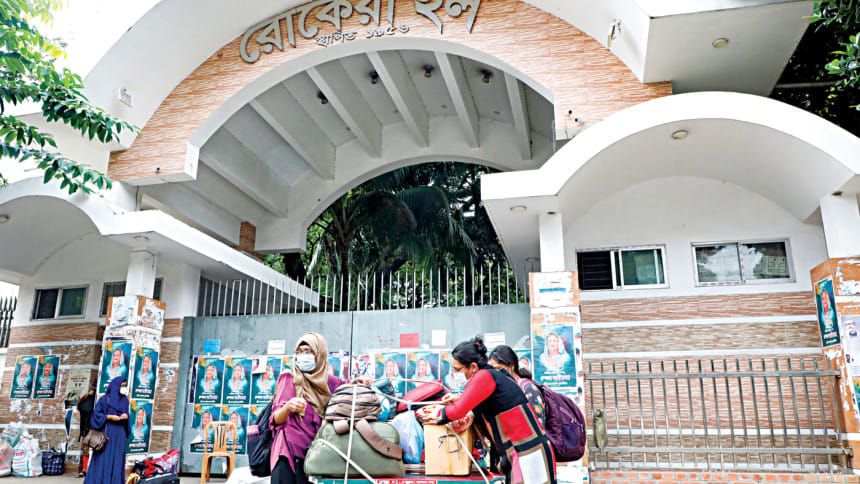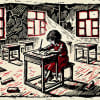Early curfews at women’s dormitories: An outdated practice

"I used to work with a theatre group, and on most days, rehearsals would take at least 9.30 PM to be over. I used to miss the curfew at 10 PM and would need to go to my friend's place in Uttara despite my campus being closer, because I didn't want to go through the process of entering through the 'late gate'," recounts Nazifa Tasnim Khanam, a senior-year Sociology student at the University of Dhaka (DU), and resident of Ruqayyah Hall, while sharing her experience with the curfew at female halls of the university.
When asked what entails with the "late gate" procedure, she mentioned that a student would require a permission slip issued beforehand, even in emergencies, to enter through a back entrance leading to the residence of the house tutor, as the main entrance of the hall is shut at 10 PM.
This process comes with a handful of inconveniences for the students. From answering many questions to even getting character-shamed, a wide range of humiliation tactics awaits them.
"The authorities have always claimed that it is for the girls' safety that they impose the curfew. If I'm not comfortable entering the dorm after curfew and have to travel halfway across the city to find a place for the night, how does that make things any safer? Does this not empower the potential perpetrators and the existing narrative of victim-blaming?" asks Nazifa.
Gatekeepers often seize students' ID cards upon late entry. Some halls might even ask them to bring in their local guardians to vouch for them.
"How do they even expect that a local guardian will always be present to address these issues? If it were that simple, would I be going for university residence in the first place? Why do I not have the freedom to enter a place I call home at my convenient time?" asks Samira Tasnim, a Geology major at DU, and resident of Shamsun Nahar Hall.
This reality is not limited to DU only. Female students in almost every public university in the country have to go through such troubles.
"Students need to call the house tutor to enter the halls after curfew. One of us had to stay out till 2 in the morning because ma'am couldn't receive the call," shares Tasnia Poushy*, a residential student of Shahjalal University of Science and Technology (SUST), Sylhet.
Afia Farzana is a third-year student of Architecture at Rajshahi University of Engineering and Technology (RUET), who couldn't avail university accommodation because the curfew made things quite difficult.
"Architecture required me to work late hours on projects. With a curfew that started at 6 PM in the winter and 7 PM in the summer, I knew I could never make it on time, and wouldn't have the energy to deal with the authorities after a day of hard work. So, I found my own living arrangements," she recalls.
The curfew leaves little to no scope for residential female students to engage in extracurricular activities, internships, or even enjoy a concert happening right on the campus premises.
"Considering the traffic situation of Dhaka, the time limit is rather too early to be met after carrying out other responsibilities. This rule also goes against the ideology of a university, where students should be encouraged to explore as much as possible. Barring them from participating in concerts, festivals and events are highly detrimental to the intellectual growth of female students," says Labiba Mehrin*, a sophomore Economics major at DU and Ruqayyah Hall resident.
The issue recently became a topic of discussion once again after the SUST vice chancellor made derogatory and misogynistic comments about female students at Jahangirnagar University (JU), who are not bound by a curfew at their halls.
However, despite no official curfew in place, female students are often harassed by hall authorities and staffers upon late entry at JU.
"They [hall authorities] often issue show-cause letters to the departments. The usual character-shaming and harassment from proctorial bodies go hand in hand for the female students here as well," says Nusrat Tuba, a residential student at JU from Bangamata Begum Fazilatunnessa Mujib Hall.
Students have called this rule inherently misogynistic, as no such provision exists for the male students of any university, who can enter their dorms at any time of the night.
"This is clearly a gendered issue. From my experience of serving as an elected Dhaka University Central Students' Union (DUCSU) member of the hall caucus, I have first-hand experience of witnessing the harassment female students have to go through in this regard. I have been a victim of such harassment myself," reports Arunima Tahsin, residential student of DU's Shamsunnahar Hall, and ex-Ducsu member.
"All of us are adults here. It is unjust that the administration claims so much agency over our movement. The fact that it's only for women makes it clearer that it's nothing but an authoritative and misogynistic practice," adds Tahsin.
Professor Kaberi Gayen of DU's Department of Mass Communication and Journalism shares her experience as a female student at the same university, saying, "We were character-shamed in our time for demanding an extension of 30 minutes to the curfew. I clearly remember the then proctor saying, 'No "good girl" can ask for such a thing.' It's utterly sad that the thoughts have remained the same even after decades."
"Curfew at female halls is an unnecessary rule. It needs to go. If safety is the cause of concern here, the authorities need to focus on making the campus safer, instead of caging half the students," adds Professor Gayen.
The restriction of movement of female students who live in public university dormitories is an appalling practice, especially given no such restrictions exist for male students. The stale arguments related to safety and guardianship are only feeble attempts to hide a culture of victim-blaming.
While society is still attempting to progress from these backdated lines of thought, our universities need to lead this movement. Instead, they're busy holding back the women they are supposed to empower.
*Names have been changed on request
Nahaly Nafisa Khan is a sub-editor at City Desk, The Daily Star.

 For all latest news, follow The Daily Star's Google News channel.
For all latest news, follow The Daily Star's Google News channel. 








Comments